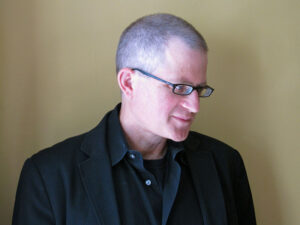
He grew up in a house without books.
He rose above the emptiness of the miles of trailers and junk yards that distinguished his West Texan upbringing to become a well-known author, poet, and professor.
Christian Wiman, past editor of “Poetry” magazine, read from poetry and prose exploring the connections between art and faith on Sept. 12 and 13 at Phillips Auditorium, in connection with Hillsdale’s Visiting Writers program.
Wiman’s career has included the publication of several well-regarded books and the opportunity to teach at many distinguished institutions, including his current position at the Yale Divinity School and the Yale Institute of Sacred Music.
“Mysteries can become integral parts of your faith that don’t have to be solved,” Wiman said of his writing and his faith, which have been influenced by difficult times in his life.
Wiman was told on his 39th birthday that he had a rare, mysterious, and incurable form of blood cancer. That Sunday was when Wiman made the decision to revisit his faith, after nearly two decades of straying from his Southern Baptist upbringing.
“A part of his appeal to me, a Christian, is that his work engages with the elemental issues of faith and doubt that should concern any thinking individual,” said John Somerville, professor of English and head of the Visiting Writers Program, which has hosted well-known writers, including B.H. Fairchild, who grew up in the same town as Wiman. “Mr. Wiman offers our students the chance to hear and read serious poetry written by an individual of our own generation, not by someone out of the past and as an object of study.”
The driving purpose for his poetry, Wiman explained in his reading Monday night, comes from a desire to find the ways that faith can appear in new forms in art. Both nights shared the same message behind his poetry—to transform the mundane into something of religious importance.
“He deals with many issues that our students have encountered in their own lives, though he does so with an intelligence and beauty that is far beyond our ordinary capacities,” Somerville said.
The most remarkable part of his mindset is that even as he acknowledged his own mortality, he found a way to see more beautiful moments in life than he had noticed before. All of his experiences, from growing up in the undereducated communities of West Texas to raising two daughters while battling cancer, have provided immeasurable inspiration for his faith and his poetry.
“I thought the best part was that he used his own poetry in it,” senior English major Sarah Reinsel said. “He would give backstory about the poetry that he created.”
The wisdom Wiman has gained from his own struggles has led him to give students this advice: “Have a community of people. You must have a community. If you’re a writer or a believer, you must have a community.”
Even this advice, Wiman explained, came from discoveries found in poetry.
“God goes riven into every single being,” Wiman’s voice resonated through the auditorium. “God goes belonging to every riven thing.”

